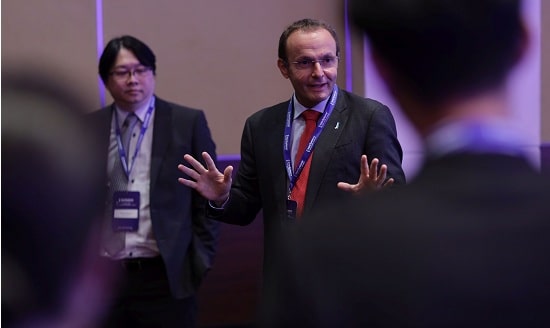Hospitals across the region have come together to share their digital transformation experiences at the first annual Healthcare Asia Pacific Customer Meeting held by InterSystems, a global leader in information technology platforms for health, business and government.
Over 100 delegates from more than 30 hospitals in China, Indonesia, Thailand, Malaysia, Australia, and New Zealand heard from some of the most technologically advanced healthcare providers in the region about their use of new digital capabilities including big data analysis, predictive analytics, artificial intelligence (AI), and machine learning.
Leading hospitals revealed how they were using advanced technologies to support transformational changes such as population health and value-based care initiatives. The Bangkok event – with a theme of “creating the future of care” – also outlined strategies to mitigate clinical safety and cyber security risks.
At the same event, attendees learned about the latest interoperability, mobility and advanced clinical technologies from InterSystems, as well as strategies to improve clinician electronic medical record (EMR) system satisfaction and adoption from healthcare IT data and insights analyst firm KLAS Research.
Healthcare Unbounded
In his opening remarks, Luciano Brustia, Regional Managing Director – Asia Pacific for InterSystems, said that despite all the innovations, breakthroughs, and increases in life expectancy, healthcare systems are still full of information silos and barriers between different people, processes, and organizations. In fact a new survey by InterSystems showed that 55% of private hospitals in South East Asia see system interoperability challenges as a barrier to digital transformation.
“Along with our customers and partners, InterSystems is creating the future of care, something we call Healthcare Unbounded, where all the different care givers are empowered with a complete and easy-to-use picture of each patient and are coordinated with each other,” said Brustia. “Advanced interoperability using standards like FHIR will extend the EMR to collect information that wasn’t available to caregivers in the past. And healthcare providers will understand their populations better, using data analytics and AI to predict healthcare risks and develop new treatments based on what works and what doesn’t work in the real world.”

Using AI to make clinical predictions
Kenny Lim, CIO of Bumrungrad International Hospital in Bangkok and Eric Widen, Co-founder & CEO of HBI Solutions, revealed how Bumrungrad had used HBI’s Spotlight solution to analyze data in its InterSystems TrakCare® EMR and employ machine learning and AI technology. This enabled the hospital to make predictions about the onset of sepsis, the risk of mortality, length of hospital stay, and likelihood of patients developing chronic diseases.
Bumrungrad’s vision is to provide “world-class holistic healthcare by 2022”, said Lim, providing patients with care and treatments for both immediate health problems and overall wellbeing. According to the InterSystems survey, Bumrungrad is one of only 5% of private hospitals in South East Asia that have deployed AI, a figure expected to rise to 56% over the next five years.
Focusing on patient-centered, smart healthcare
Dr. Jenny Shao, Health Information Systems Director for United Family Healthcare in China, shared key learnings from UFH’s 11-year journey with TrakCare. UFH has already transformed from a clinician-centered to a patient-centered approach to care, and is currently transforming from a focus on the patient to a focus on the whole person.
Dr. Shao also previewed UFH’s next transformation to smart healthcare, smart hospital and community, applying technology to support “P4 healthcare” which was predictive, preventative, personalized, and participatory.
Mitigating safety and cyber security risks
While minimizing clinical risks is a key driver of digitization, delegates heard about strategies to mitigate the clinical safety and cyber security risks that also come with digital healthcare.
InterSystems Clinical Safety Managers from China, Thailand, and Australia/New Zealand spoke about the company’s clinical safety framework, which identifies and assesses risks and proactively takes action to mitigate them. Attendees learned about how they could become personally involved in patient safety initiatives at their own hospitals and partner with InterSystems to further improve patient safety for all TrakCare EMR users.
According to Ken Mortensen, Data Protection Officer for InterSystems, systems interoperability and the cloud have created a bigger attack surface for hackers. However, the cloud now also enables healthcare providers to centralize security controls to increase systems security. Mortensen recommended a readiness assessment to better understand the cyber threats healthcare providers face and to assess whether hospitals have the right security measures in place to deal with them and whether staff are properly trained about privacy and security.
Mobility and TrakCare Open Access
Delegates learned about the expanded capabilities of the latest version of TrakCare, built on the InterSystems IRIS for Health™ data platform, and how IRIS has boosted systems interoperability, cloud scalability and healthcare big data capabilities. They also heard how mobility is improving the user experience wherever care is delivered.
Dimitri Fane, Director of Product Management for TrakCare, demonstrated how the product’s mobile-enabled user interface supports all clinical workflows, including operating theatre bookings and administration, maternity and nursing care plans, dynamic patient lists, and a patient journey tracker.
InterSystems also introduced Asia Pacific customers to TrakCare Open Access, enabling them to develop or deploy solutions based on the SMART on FHIR standard. “We are actively seeking Asia Pacific customers to partner with us around SMART on FHIR to innovate and enhance the TrakCare experience to take full advantage of their EMR data,” said Fane.
About InterSystems
InterSystems is the information engine that powers some of the world’s most important applications. In healthcare, business, government, and other sectors where lives and livelihoods are at stake, InterSystems has been a strategic technology provider since 1978. InterSystems is a privately held company headquartered in Cambridge, Massachusetts (USA), with offices worldwide, and its software products are used daily by millions of people in more than 80 countries. For more information, please visit http://www.intersystems.com/
















